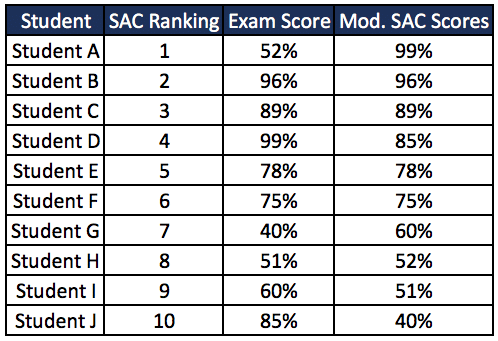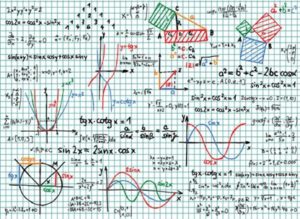How do SACs WORK? VCE Explained
the importance of sac
Table of Contents
Introduction
Now I don’t know about you guys, but when I was heading into VCE I heard tons of conflicting information on SACs ranging from:
😱 “SACs are so important, they account for THIS MUCH of your study score!”
To
😐 “Your SAC results don’t really matter, some people barely passed SACs and still managed to get a 40+ study score”
To
😋 “Don’t worry about how SACs work, just try your best!”
If you’re going to listen to any advice, listen to option 3. However, although it might be good ignoring VCAA’s mysterious moderation process, it’s important to at least develop a rough understanding of how it works, as it hopefully relieves some stress for those of you who like to leave nothing up to chance. That’s what I’ll try to help you with in today’s blog.
So, how exactly do SACs work, and do they actually matter?
Yes and no… There’s really no simple answer. I’m going to use Maths Methods as an example here.
In a sense, yes, your SACs do matter. VCAA needs a way to assess you on what you’ve done throughout the year, not just what you did in two hours during an exam. They are starting to shift away from the “one exam determines your entire fate” ideology – instead, they’re trying to assess a variety of assessments to hopefully test more than your exam-taking ability. While this is good in the sense that you can take comfort knowing that your score will more accurately reflect your skills throughout the entire year, it also means we have to deal with those dreaded 10 mark explore questions.
However, the actual mark you get on each SAC does not really matter. Seems counterintuitive? Let me explain.
Your study score consists of two components, the coursework (AKA SACs) and the final end of year exam. Throughout the year you complete SACs, with each SAC being worth a percentage of your “coursework” score. The amount they are worth varies greatly between subjects, as high as 50% in English to just 33% in Methods. You can check out just how much each SAC and Unit is worth by checking the subject’s study design on the VCAA website if you go to the school-based assessment section.
After you complete all your SACs, your school will add your scores together. Here is where it gets interesting. The actual SAC score doesn’t matter, what happens here is that every person doing the subject as a Unit 3/4 in your school gets ranked by their SAC score. This ranking is what goes to VCAA. So you could get 70% overall but it can still be a high rank depending on how everyone else has done.
A bit weird right? But this is done to ensure that the difficulty of the SACs have no impact on your study score. For example, it won’t be fair if someone goes to a school with really hard SACs where the average is 40%, compared to a school with far easier SACs with 90% as the average.
How do SACs work: 5 student cohort
But what do these rankings mean? It can be very confusing, so let me use a small-scale example to explain.
Say in a parallel universe there are five students in a Maths Methods cohort: myself, Laurence, Carlos, Kevin and Larry. Here are what everyone has achieved for the SACs:
|
Name |
SAC Score |
SAC Ranking |
|
James (me) |
100% |
1 |
|
Laurence |
95% |
2 |
|
Carlos |
80% |
3 |
|
Kevin |
75% |
4 |
|
Larry |
50% |
5 |
Once everyone has done their exams, the exam scores of everyone in your cohort are then ranked as well. For explanation’s sake, let’s say I didn’t perform as well in the exam (hold your disbelief!)
|
Name |
Exam Score |
Exam Ranking |
|
James (me) |
90% |
2 |
|
Laurence |
100% |
1 |
|
Carlos |
69% |
5 |
|
Kevin |
70% |
4 |
|
Larry |
85% |
3 |
Now, the SAC scores will be scored accordingly. Because I was Rank 1 for SACs, my SAC mark will become the highest exam mark, which is Laurence’s 100%. Laurence, who was Rank 2 for SACs, will then take the Exam Rank 2’s exam score (90%). However, everyone’s exam marks will stay as their own. So after some VCAA moderation, this is what the final result will look like:
|
Name |
Moderated SAC Score |
Exam Score |
Final Score |
|
James (me) |
100% |
90% |
93.3 |
|
Laurence |
90% |
100% |
96.7 |
|
Carlos |
85% |
69% |
74.3 |
|
Kevin |
70% |
70% |
70 |
|
Larry |
69% |
85% |
79.9 |
As you can see, the final exam ranking basically became everyone’s rankings in the end.
Moral of the Story
So this is how SACs work. Hopefully everything is a bit clearer now.
And the take-home message?
Yes, SACs do matter, but they’re not the be-all-end-all. You’re not “competing” with your classmates. You want everyone to ace the exam so that all of your SAC marks will be scored highly. So help each other! Don’t be discouraged by low SAC scores, because ultimately, as long as you and your cohort perform well for the exam, anything is possible!








